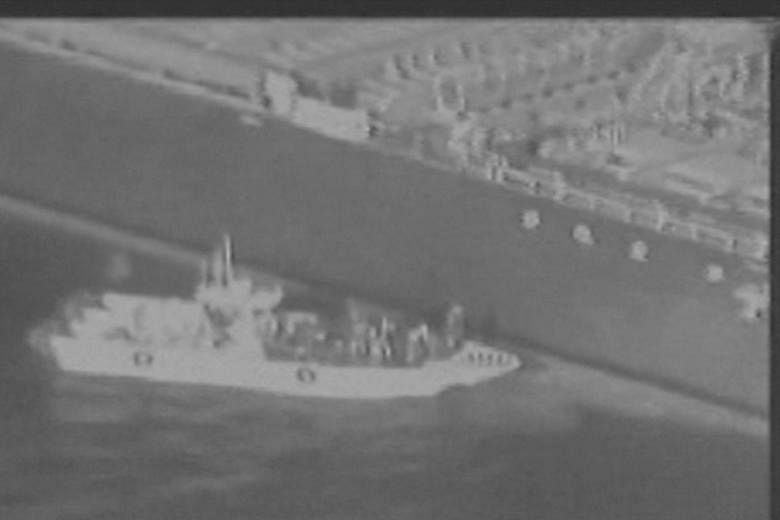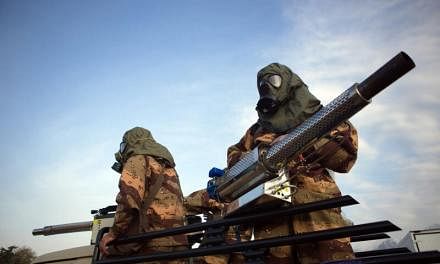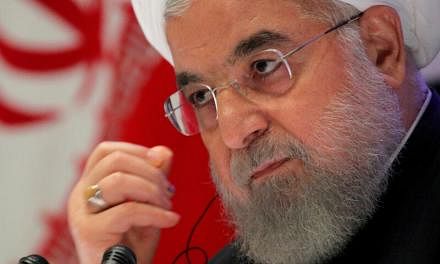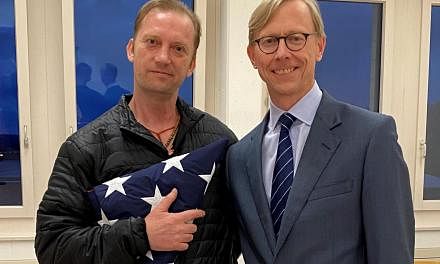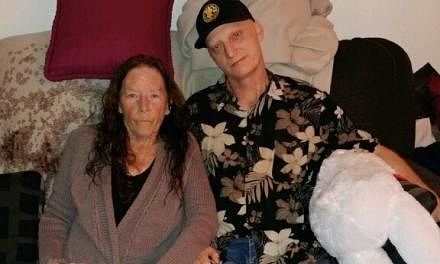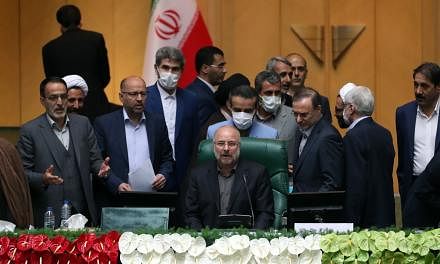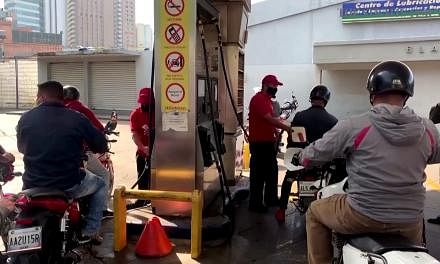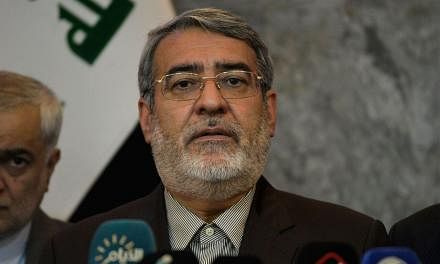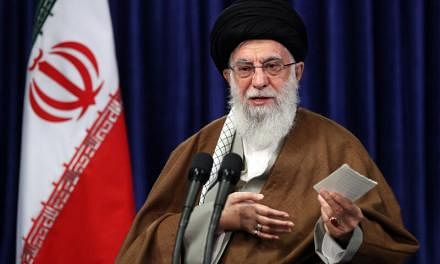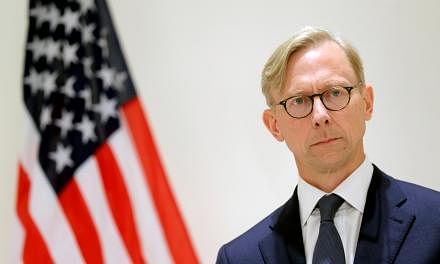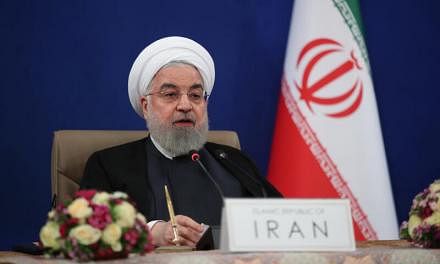WASHINGTON (BLOOMBERG, REUTERS, AFP) - Iran dismissed as "baseless" on Friday (June 14) US accusations that it carried out twin attacks that left two tankers ablaze in the Gulf of Oman, escalating tensions across the region and sending world oil prices soaring.
Its dismissal came as American officials released images they said show that Iran was involved in an attack on an oil tanker near the entrance to the Persian Gulf on Thursday (June 13), one of a pair of incidents that have raised tensions between the United States and Iran over the past day.
Foreign Minister Mohammad Javad Zarif tweeted Friday that the US administration had "immediately jumped to make allegations against Iran without a shred of factual or circumstantial evidence".
He accused it of seeking to "sabotage diplomacy" amid a visit to Iran by Japanese Prime Minister Shinzo Abe and "cover up its economic terrorism against Iran" in enforcing crippling unilateral sanctions.
An Islamic Revolutionary Guard Corps patrol boat "was observed and recorded removing the unexploded limpet mine from the Kokuka Courageous", one of two tankers attacked on Thursday, according to Navy Captain Bill Urban of the US Central Command. That was after another mine had already detonated, damaging the ship, the US said.
The video and photographs showing a boat alongside the hull of a larger vessel with a hole in its side were released by the US Central Command along with a timeline of the episode.
It was the first evidence publicly put forward by the US to support its claim - announced earlier on Thursday by Secretary of State Mike Pompeo - that Iran was behind the attacks. Iranian officials have rejected the accusation.
"Both vessels were in international waters in the Gulf of Oman approximately 10 nautical miles apart at the time of the distress calls," Capt Urban said in a statement, adding that the crew of the Courageous was rescued by a Dutch tug and later taken aboard the USS Bainbridge. He said that the crew of the second tanker, the Front Altair, were put aboard a Revolutionary Guard Corp vessel.
Iran said on Friday (June 14) that blaming it for attacks on two oil tankers in the Gulf of Oman was alarming.
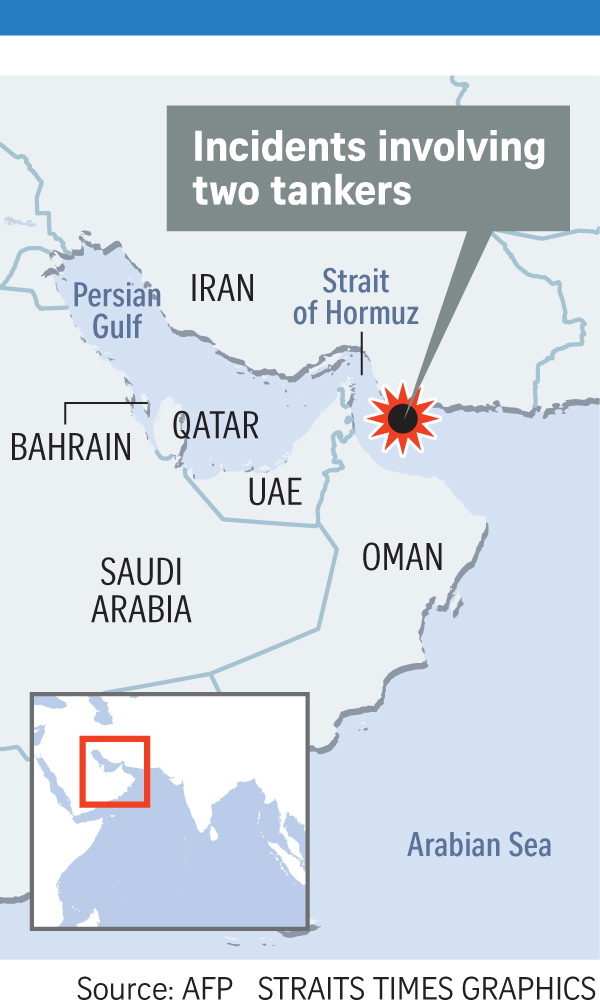
"We are responsible for ensuring the security of the Strait and we have rescued the crew of those attacked tankers in the shortest possible time," Radio quoted Foreign Ministry spokesman Abbas Mousavi as saying.
"Obviously, accusing Iran for such a suspicious and unfortunate incident is the simplest and the most convenient way for (US Secretary of State Mike) Pompeo and other US officials. These accusations are alarming."
Kokuka Sangyo, the Japanese operator of the Courageous, said it was attacked twice on Thursday, in incidents that were three hours apart, forcing the crew to evacuate. The tanker was carrying 25,000 tonnes of methanol from Saudi Arabia to Asia. Japanese public broadcaster NHK, citing Kokuka Sangyo's chief executive officer, said the ship was hit by a shell.
The ship's crew said it saw a "flying object" before a second blast on board, the operator's head. "The crew members are saying that they were hit by a flying object. They saw it with their own eyes," Yutaka Katada, head of Kokuka Sangyo shipping company, told reporters.
The manager of the Norwegian-owned Front Altair said it was sailing in international waters when it was damaged by an explosion, and that the episode was being treated as a "hostile attack". The ship had loaded a cargo of naphtha in Abu Dhabi and was bound for Taiwan, a company official said.
Hours before the US Central Command provided its evidence to bolster the US accusations, Mr Pompeo pinned the blame on Iran but declined to take questions from reporters.
"The United States will defend its forces, interests and stand with our partners and allies to safeguard global commerce and regional stability," he said, noting that Iran had previously threatened to curtail oil transport in the Strait of Hormuz.
Iranian officials denied any involvement, with Foreign Minister Mohammad Javad Zarif suggesting that Iran's enemies may have been behind the attacks, and reiterating calls for a regional dialogue.
"Suspicious doesn't begin to describe what likely transpired," he wrote on Twitter earlier on Thursday.
Almost a fifth of the world's oil passes through the Strait - some 17.2 million barrels per day (bpd). Consumption was about 100 million bpd in 2017, data from analytics firm Vortexa showed.
Brent crude futures rose 0.6 per cent to US$61.69 per barrel in Asian trade on Friday, having gained 2.2 per cent the previous day, though at one point they had surged as much as 4.5 per cent in the wake of the attacks. The tanker attacks have provided only a relatively small boost to prices that have been hammered by a deepening trade war and swelling US stockpiles.
Before the video's release, Kuwait's envoy to the United Nations, Mr Mansour Al-Otaibi, said it was too soon to assign blame.
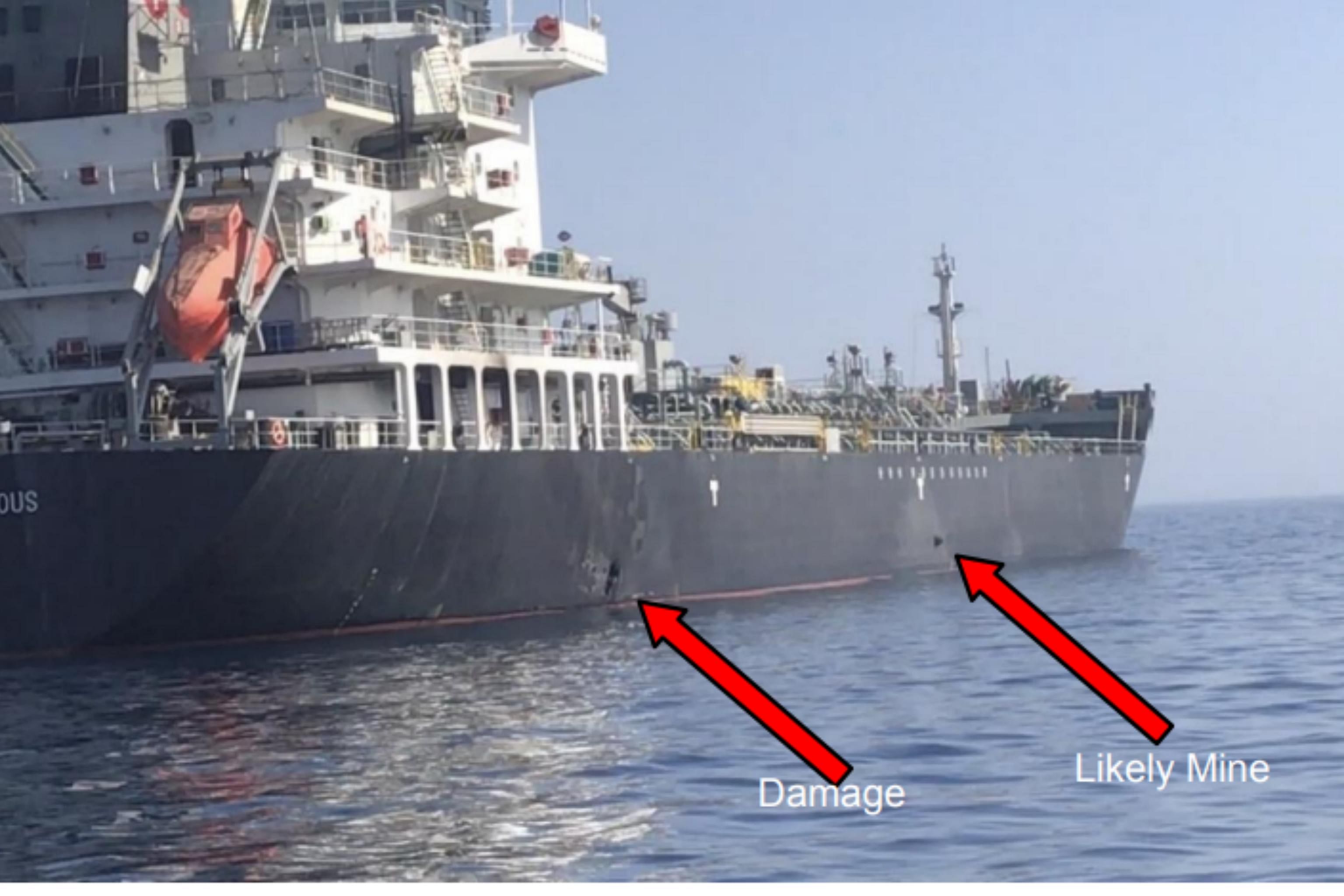
"We are not going to blame anyone yet, the investigation is still going on," Mr Al-Otaibi told reporters before a UN Security Council meeting on Thursday on the attacks. Another diplomat at the UN briefing, who asked not to be identified discussing a closed-door conversation, said the US did not present hard evidence of Iran's culpability.
US Ambassador Jonathan Cohen told reporters after the Security Council meeting that "the US will continue its diplomatic and economic efforts to bring Iran to the negotiating table. And Iran should meet us with diplomacy, not with terror, attacks on ships, infrastructure and diplomatic facilities".
The tanker attacks occurred as Japanese Prime Minister Shinzo Abe was in Teheran meeting officials in what was seen as an effort to help ease tensions between the US and Iran.
The episode came a day after Iran-backed Houthi rebels in Yemen fired a missile at a Saudi airport, wounding 26 people.
The missile crashed into the arrivals hall, damaging ceilings and windows and causing a fire, though the airport was able to keep functioning with only two flights cancelled. The Houthis last month hit oil infrastructure hundreds of kilometres inside Saudi Arabia, forcing it to temporarily close a pipeline.
Senior Trump administration officials said earlier on Thursday that the US was considering a number of responses, including the possibility of providing naval escorts to commercial ships travelling through the Strait of Hormuz. An American military response has not been ruled out, they said, saying all options are on the table.
The prospects of a conflict have heightened since the administration tightened its sanctions on Iranian oil exports in early May, following President Donald Trump's decision a year ago to withdraw from the 2015 Iran nuclear accord.
"The attacks put upward pressure on the probability of a US-Iran conflict in the Gulf (currently 30 per cent)," the Eurasia Group said in a note before Mr Pompeo spoke.
"The incidents appear aimed at demonstrating the vulnerability of Gulf shipping while damaging confidence in the US ability to protect freedom of navigation."
Capt Urban's statement as well as an earlier one from the US Central Command said that while the US would defend itself and its interests, it had no wish for a new war in the Middle East.
